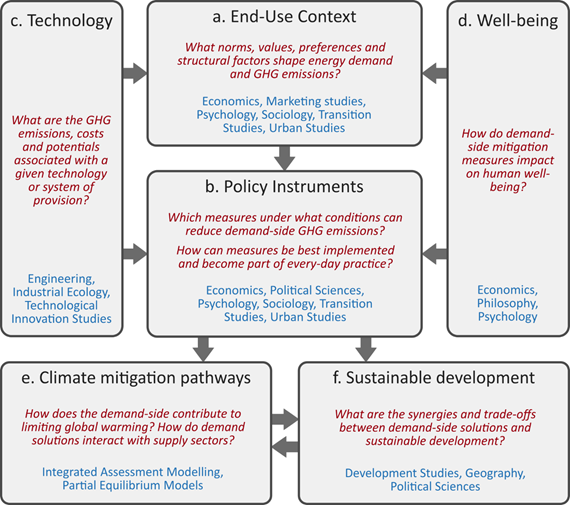Demand-side potential needs proper attention to mitigate climate change

Solutions that address demand for energy and associated changes in behaviour, lifestyles and social norms should be given a stronger focus in climate change mitigation say a group of researchers.
Writing in Nature Climate Change, the team of scientists, including Prof Jan Minx, Professor Julia Steinberger and Prof Wandi Bruine de Bruin from the Priestley International Centre for Climate, set out the case for a transdisciplinary assessment of demand-side solutions to complement low-carbon “supply side” technologies.
The latter have tended to dominate climate research, leading to a knowledge gap around demand-side solutions, despite the fact that they pose fewer environmental risks.
With the forthcoming IPCC Sixth Assessment Report devoting a chapter to demand, services and the social aspects of climate change mitigation, the time is right, say the authors in a comment piece, to understand fully the demand side’s contribution.
The team, led by Prof Felix Creutzig of the Mercator Research Institute on Global Commons and Climate Change (MCC), is calling for this to be addressed through a comprehensive assessment of the methods and underlying science of demand-side approaches.
“This requires research synthesis across a wide range of disciplines, such as economics, sociology and psychology, as well as, for example, engineering, geography and marketing,” said Prof Creutzig, who was awarded the Piers Sellers 2017 prize for a world leading contribution to solution focused climate research by the Priestley Centre.
“We must understand why certain patterns of consumption and behaviours prevail and on what norms, values and preferences they are based.”
As a common framework for enabling transdisciplinary collaboration, discussions and research, the authors suggest an “Avoid-Shift-Improve” (ASI) approach. Applied to the transport sector, traffic can be avoided through intelligent urban planning or increased tele-working; shifted to climate-friendly public transport and improved in terms of emissions by the use of electric vehicles, for example.

Key research questions and contributing disciplines for assessing demand-side solutions to mitigate climate change (Creutzig et al)
This framework enables the categorization and comparison of policy options, which can lead to cross-sectoral learning – essential for grasping the bigger picture in terms of mitigation options, said co-author Jan Minx, Professor of Climate Change and Public Policy at the Priestley Centre.
“A successful decarbonisation of energy supply remains central, but needs to be strongly complemented by demand-side efforts,” he emphasized. “Demand-side mitigation solutions open up an enormous potential for energy and carbon emission savings without jeopardizing service level and quality.
“When implemented alongside a well-coordinated price on carbon, they could rapidly accelerate the urgently needed phasing out of coal.”
